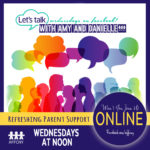Amy and Danielle will discuss advocating for your school aged child, what you need know in terms of the categories of special education and what you can ask for on behalf of your child./em>
CSE’s, IEP’s and 504’s – Advocating for your school aged child: What you need to know.
All the acronyms what do they all mean?
- CSE is committee on special education
- IEP is individual education plan; To be eligible for an IEPunder this law, your child must meet these criteria: … Have an identified disability that impedes learning to the point that the child needs specialized instruction in order to close the gap between the child’s own academic achievement and that of his/her age peers.
There are 13 categories of special education as defined by the Individuals with Disabilities Education Act (IDEA). In order to qualify for special education, the IEP team must determine that a child has one of the following:
- Autism
- Blindness
- Deafness
- Emotional Disturbance
- Hearing Impairment
- Intellectual Disability
- Multiple Disabilities
- Orthopedic Impairment
- Other Health Impaired
- Specific Learning Disability
- Speech or Language Impairment
- Traumatic Brain Injury
- Visual Impairment
504 is a plan developed to ensure that a child who has a disability identified under the law and is attending an elementary or secondary educational institution receives accommodations that will ensure their academic success and access to the learning environment. Like an ramp for a child in a wheel chair.
How does the process go?
- Referal and consent: You can request evaluation for your child based on school performance and new diagnosis
- Evaluation: they have 60 calendar days to complete the evaluation from date of referral
- IEP Meeting: If your child is found to have a disability they have 60 school days to implement appropriate placement.
What Kinds of Educational Accommodations Can My Student Get?
ASSISTIVE TECHNOLOGY (AT) This includes equipment, devices, and services that help students with disabilities participate in school. Assistive technology can also include training for parents, professionals, and students on how to use a device.
RELATED SERVICES These include group or individual speech and language therapy, occupational therapy (OT), physical therapy (PT), counseling, hearing and vision services, orientation and mobility services, and school health services.
SUPPLEMENTARY AIDS AND SERVICES These services may include special education teacher support services (SETSS), formerly known as resource room, consultant teacher services (teacher support), and one-to-one paraprofessionals, who are similar to teacher’s aides.
TESTING ACCOMMODATIONS There are many possible accommodations, but some common ones include getting extra time to take a test, having questions read aloud, testing in a separate location, and using a calculator on tests.
TRANSITION SERVICES Transition services are meant to help students prepare for life after high school, and must be included on an IEP during the year the student turns 15. These services may include instruction, related services, community experiences, development of employment or other adult living skills, acquisition of daily living skills, and vocational assessments.
MODIFIED PROMOTION AND ALTERNATE ASSESSMENT Students with modified promotion will be held to a lower percentage of grade level learning standards for promotion as determined by the IEP team. Note: There are no modified promotion criteria for high school, so students must pass required classes and exams in order to get a diploma. Students with Alternate Assessment indicated on their IEP are exempt from standard promotional criteria and will not graduate with a local or Regents diploma.
What do I need to know when advocating for my child?
- You are an expert about your child
- You don’t have to agree the school’s decision
- You can have people with you, advocate, support people
- You need to know your rights, the school is not always there to help, and a lot of the time will not tell you what you are entitled to.
FOR MORE INFO:
AFC Guides & Resources: Students with Disabilities and Special Education
NYS Resource Directory for Children and Young Adults with Special Health Care Needs
 Each week, Amy and Danielle will broach a range of topics and explore deeply into the matters at hand that directly affect our families. Pull up a chair and listen in as Amy Drayer, Director of Foster Kinship and Parent Group Support, and Danielle Skelly, AGAPE Long Island Family Support Specialist at the Adoptive and Foster Family Coalition of New York, talk about some of our favorite subjects having to do with foster care, adoption, caring for others kids plus the legalities of custody, guardianship, and the courts.
Each week, Amy and Danielle will broach a range of topics and explore deeply into the matters at hand that directly affect our families. Pull up a chair and listen in as Amy Drayer, Director of Foster Kinship and Parent Group Support, and Danielle Skelly, AGAPE Long Island Family Support Specialist at the Adoptive and Foster Family Coalition of New York, talk about some of our favorite subjects having to do with foster care, adoption, caring for others kids plus the legalities of custody, guardianship, and the courts.
Take some time for yourself and tune in every Wednesday at noon for

